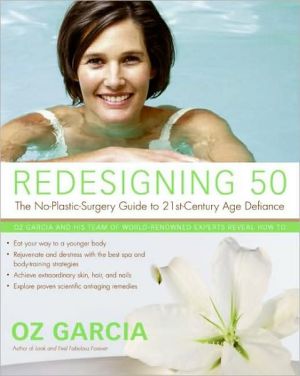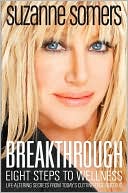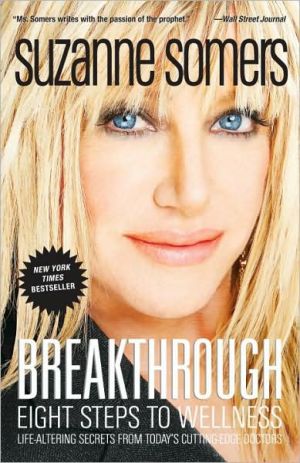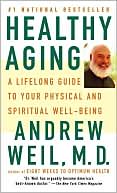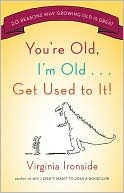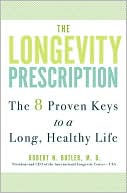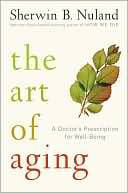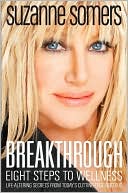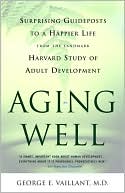Redesigning 50: The No Plastic Surgery Guide to 21st-Century Age Defiance
When you reach middle age, what does it take to turn back the hands of time and regain the youthful vitality of your younger years? Top nutritionist and health authority Oz Garcia offers definitive guidance in his information-packed Redesigning 50.\ You'll discover what Oz calls "the New 50": a fitter, healthier, better-looking middle age than you ever imagined possible. Oz explains how to take advantage of the finest that science and artistry can offer—without going under the knife. Drawing...
Search in google:
When you reach middle age, what does it take to turn back the hands of time and regain the youthful vitality of your younger years? Top nutritionist and health authority Oz Garcia offers definitive guidance in his information-packed Redesigning 50. You'll discover what Oz calls "the New 50": a fitter, healthier, better-looking middle age than you ever imagined possible. Oz explains how to take advantage of the finest that science and artistry can offer—without going under the knife. Drawing on the foremost expert opinions in health and beauty, Oz offers the latest information about diet and nutrition, exercise, skin and body care, hormones, stress reduction, dental and cosmetic treatments, and the new nutraceuticals—giving readers the tools to look younger and feel better than they have in years. You'll learn how to implement "the New 50 Fusion Plan," Oz's simple yet powerful fusion of "efficiency foods" with the healthy dietary traditions of Japan and the Mediterranean. You'll learn safe detox plans from experts Adina Niemerow and Roni DeLuz, hair how-to from Joel Warren and Edward Tricomi of Warren-Tricomi and Frédéric Fekkai, culinary insights from renowned chef David Bouley, spa secrets from the Golden Door and others, beauty advice and makeup tips from Bruce Dean, skin-care savvy from Dr. Nicholas Perricone and rejuvenation techniques from Dr. Lisa Zdinak and Dr. Lisa Airan, exercise insights from David Barton of David Barton Gyms, and fitness assessments from Suzanne Meth of Equinox Fitness Clubs, among others. Oz pulls it all together with his decades of experience into an enlightened, effective approach to antiaging. Hundreds of Oz's clients—women and men from across the country—have found success under his supervision. The powerful results are documented in candid accounts, from the busy company executive to the harried parent. Their antiaging success stories inspire and motivate readers to begin their own journey. The result? Middle age has never looked or felt so good! New York “The best nutritionist in New York.”
Redesigning 50\ The No-Plastic-Surgery Guide to 21st-Century Age Defiance \ Chapter One\ Oz Eats His Words\ Redesigning the Way We Eat\ we all need to move toward a more mature relationship with food. If we want to be healthy, we need to move away from what I believe is a uniquely American experiment: "dieting by extremes"—that is, eating food cooked only one way (or not cooked at all) or eliminating entire food groups. The goal of the Redesigning 50 eating program is to help you establish a natural, comfortable relationship with food that allows you to eat a great variety of proteins and carbohydrates, cooked in ways that are delicious as well as nutritionally sound.\ Ironically, I came to these conclusions about the American diet when I left the country. In other parts of the world, I learned not only about the foods of other countries but also about their mealtime traditions. Specifically, I visited two areas of the world with very different foods on their menus; yet, I also found some striking similarities. Both countries have a noticeable lack of overweight people. Both countries have long-standing and continuing traditions of family mealtimes. And in both countries, meals often consist of many different courses served over a period of two to three hours.\ The two countries I visited were Japan and Greece.\ Melding Traditions\ I spent several weeks in Japan recently and decided that while I was there, I would eat only traditional Japanese foods. Almost all the social occasions and business meetings took place around food. I became enchanted with the Japanese diet not only because ofits nutritional content but also because of its beautiful presentation. Even on the subway in Tokyo, you can get a lunchtime Bento box (single-portion takeout meal) with a bit of fish in one compartment, chicken in another, some rice, seaweed, and pickled vegetables. The meal is both filling and aesthetically pleasing. When my hosts took me to a traditional restaurant in Kyoto, our business lunch lasted almost three hours. We were served many courses; each course was small in portion, but rich in flavor and centered on vegetables.\ I've also been influenced by the dietary practices of the Mediterranean countries, especially Greece. It's been demonstrated that olive oil, red wine, fish, and vegetables, which are abundant in the Mediterranean diet, are anticarcinogenic and contribute to the long lives of the people of this region. Even though the Mediterranean diet is high in fat (some studies have shown that almost 40 percent of its calories come from fat), it contains mostly monounsaturated and polyunsaturated fats—the kinds that are good for your health. Greeks are generally lean and have one of the lowest levels of heart disease in the world. Compare this with the American diet, which is almost 38 percent fat—most of it saturated fats, which contribute substantially to the prevalence of cardiovascular disease in the United States.\ In fact, a study published in the British Medical Journal in 2005 looked at 74,000 healthy men and women over the age of sixty in nine European countries, and concluded that people in Greece and Spain (where they most closely follow a Mediterranean diet) had a significantly longer life expectancy than people in other countries.\ Defining the Mediterranean Diet\ When people refer to the Mediterranean diet, they're actually referring to the traditional diet of the island of Crete prior to 1960. According to a 2001 article by Artemis P. Simopoulos in the Journal of Nutrition, presented at the 11th Annual Research Conference on Diet, Nutrition and Cancer (which was sponsored by the American Institute for Cancer Research), the Mediterranean diet resembles the Paleotech diet in amounts of fiber, antioxidants, saturated fat, monounsaturated fat, and the ratio of omega-6 to omega-3 fatty acids (a ratio of 2 to 1, as opposed to the current American ration of 16.74 to 1). The diet consists of foods rich in omega-3s (salmon, tuna, herring, mackerel, flaxseeds, green leafy vegetables), monounsaturated oils (olive and canola), seven or more servings of fruits and vegetables a day, lean meat, and low-fat dairy products. Simopoulos concluded that the traditional Greek diet, balanced in omega-6 and omega-3 fatty acids and rich in vitamins C and E from fruits and vegetables, "is associated with decreased rates of heart disease and cancer more so than any other diet or drug intervention."\ Nutrition and Aging\ There is one nutritional fact that we, with our Western sensibility, may find hard to swallow: We simply can't eat as much as we used to. When we were kids, we could eat all the time and burn it off easily. In our teens and twenties, when we were active all day and half the night, our energy output was at an all-time high. As we age, however, our metabolism naturally slows down. We have more body fat and less lean muscle. Therefore, we need to consume fewer calories (while following a program of muscle-building exercises, which is discussed in chapter 5). In addition, we must pay more attention to the quality of the foods we consume. A young body can process almost any kind of food, but as we get older our nutrient needs increase while our calorie needs decrease.\ Getting the highest nutrient value from the food we eat is important throughout our lives, but it becomes even more important as we age. Eating right can help stave off the diseases prevalent among older people and can help improve the quality of life for those who already have some of these conditions. Many years of research and experience have taught me to appreciate the functional aspects of food—its inherent potential to improve energy; help maintain lean muscle mass; shore up aging immune systems; protect against heart disease, diabetes, and cancer; and enhance the overall quality of life. Now that we are living longer lives, this is more important than ever. I look at my parents and their generation, and I see how their eating habits (traditional Cuban fare with an emphasis on meat, saturated fats, and fried foods) have had a negative impact on their senior years. They did not have the benefit of the science of nutrition we now have at our fingertips.\ Redesigning 50\ The No-Plastic-Surgery Guide to 21st-Century Age Defiance. Copyright © by Oz Garcia. Reprinted by permission of HarperCollins Publishers, Inc. All rights reserved. Available now wherever books are sold.
Acknowledgments xiIntroducing the New 50 xiiiFood: Fueling Yourself to a Younger Body 1Oz Eats His Words: Redesigning the Way We Eat 5Cleaning House: Detoxing for Health 25Eating in the Real World: Tips for Dining Out 45Rejuvenation: Feeling Like Thirty Again 53The Spa Experience: A Week Away or an Evening at Home 60Training for Life: Get Your Body Moving 69Beauty: Facing Up to Aging 83Skin Deep: Entering the No-Plastic-Surgery Zone 90Alternative Options: From Dermatology to Mesotherapy 99Your Crowning Glory: Components of Beauty from the Outside In 114Alchemy: Exploring the Biological Landscape of Age Reversal 129Diagnostics: Seeing the Inside Story 134The Estrogen/Testosterone Question: Discussing Hormone Health, Menopause, and Andropause 151Aching and Aging: Alternatives in Pain Care 164Longevity and the Brain: Keeping Mentally Young 172Oz's Guide to Supplements: The New Nutraceuticals 181Epilogue 207Resource Guide 213Index 219
\ Veronica Webb"If you are looking to be your most beautiful, this is the book for you."\ \ \ \ \ Cosmopolitan on The Balance“My level of energy was outrageous, my complexion was clear—and no more menstrual cramps. I was amazed... at the end of three months I had dropped the pounds I set out to lose.”\ \ \ New York"The best nutritionist in New York."\ \ \ \ \ Cosmopolitan“My level of energy was outrageous, my complexion was clear—and no more menstrual cramps. I was amazed... at the end of three months I had dropped the pounds I set out to lose.”\ \ \ \ \ New York“The best nutritionist in New York.”\ \
